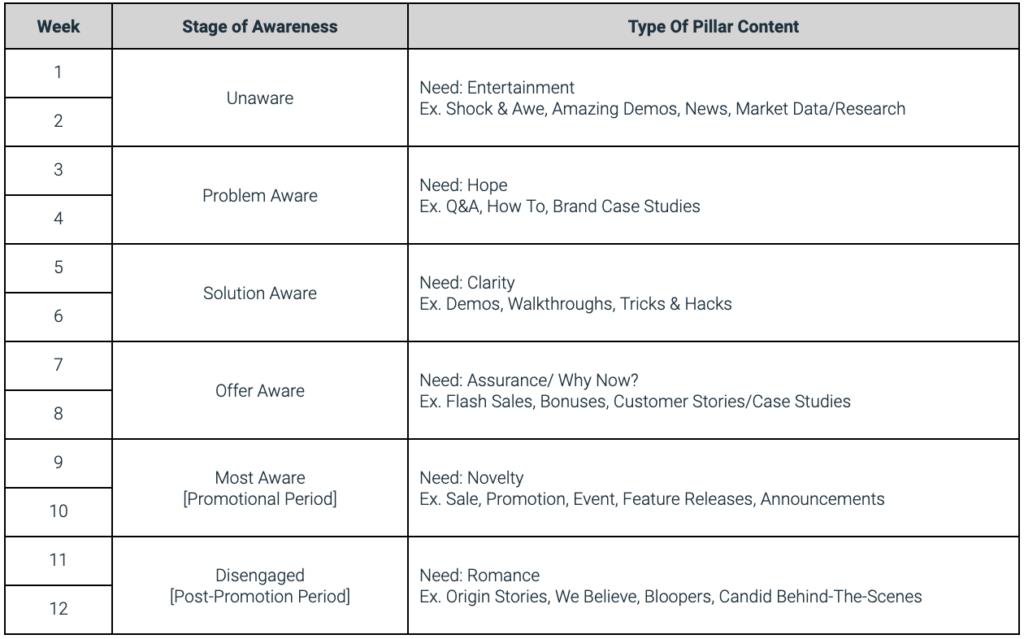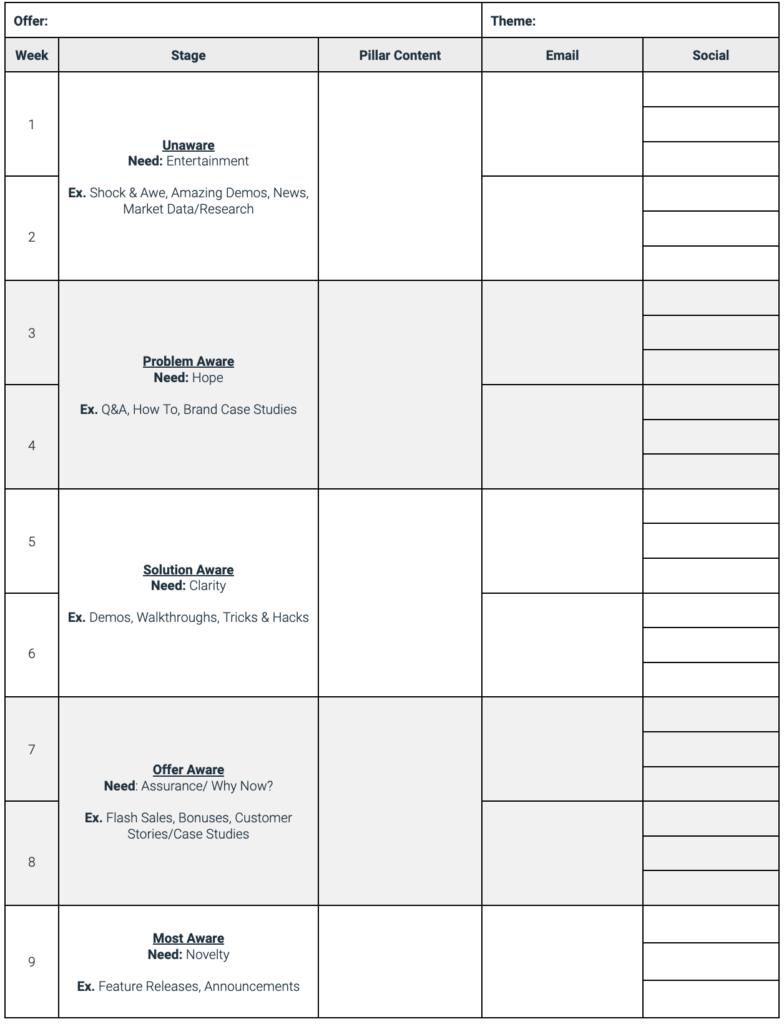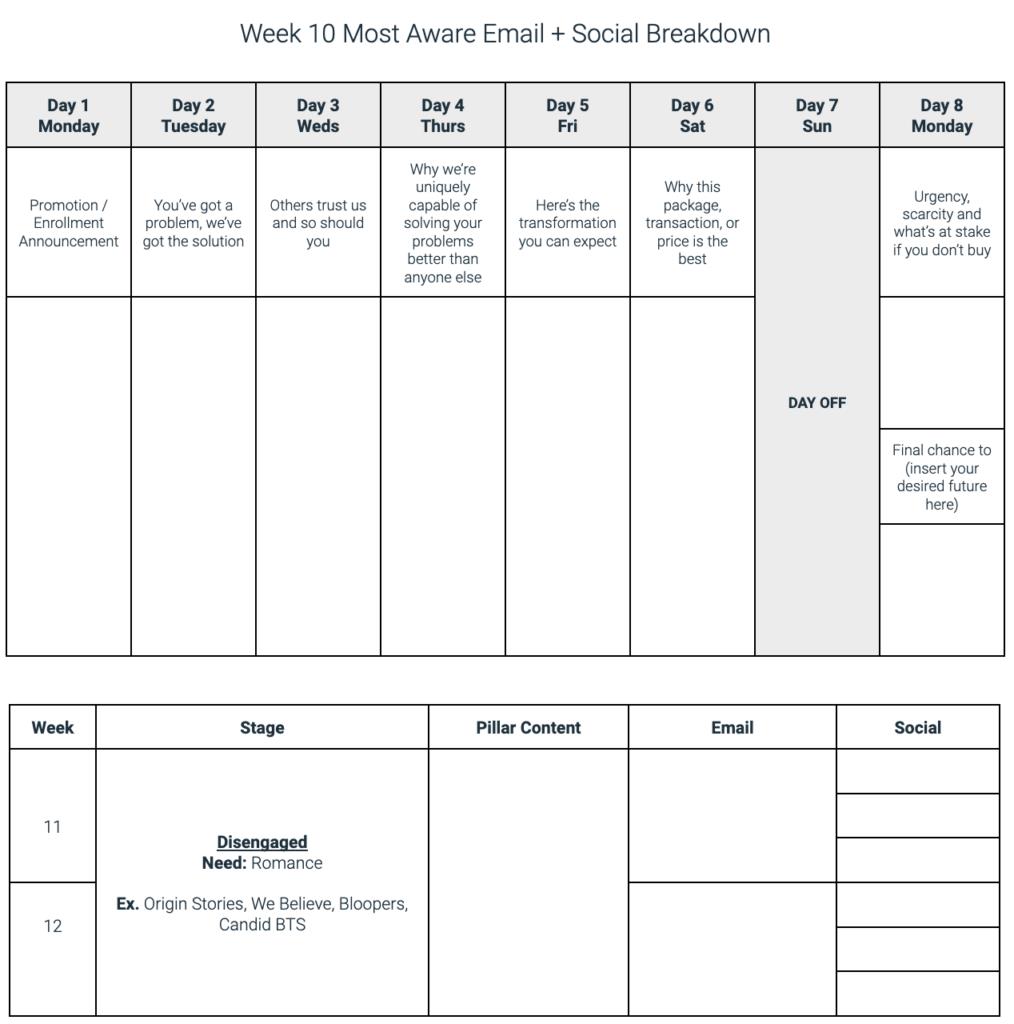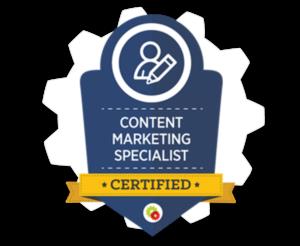
How to build a content campaign that drives sales quarter after quarter.
We all know the importance of creating content– but creating content for the sake of it doesn’t often result in increased sales. Content campaigns are a great way to engage your audience, build brand awareness, and drive sales quarter after quarter.
In this article, you’ll learn how to create a 90-day content campaign that will deliver lasting value to your business, move prospects through the customer journey more efficiently and effectively, and drive sales! Let’s get started!
6 Levels of Customer Awareness
As your prospects move through the customer journey, their awareness of your brand and offer increases.
In 1966 Breakthrough Advertising, marketer and author Eugene Schwartz identified five stages of customer awareness. Since then, digital marketing has evolved significantly, creating the need for a sixth level of customer awareness that DigitalMarketer introduced.
First, we’ll walk through each level of customer awareness and then create a content campaign that moves prospects through these levels to increase the speed and efficiency of your customer journey.
1. Unaware Stage
Customers in the unaware stage have no knowledge of the problem or perceived need for a solution. To catch a prospect’s attention and keep it, we need to stop the scroll. The best way to do that is with entertainment!
Types of entertaining content for the unaware stage:
- Shock and Awe
- Amazing Demos
- Data/Research
Examples:
- Dollar Shave Club Commercial
- Chatbooks Commercial
- Will It Blend Demo
- Thinkific 13 Membership Site Examples That Will Inspire You
- 125 Books Every Marketer Should Read
Tip: As you scroll social media and the internet, think about the advertisements and content that catch your attention.

2. Problem-Aware Stage
Customers in the Problem-Aware Stage know they have a problem but don’t know if a solution exists. They are in need of hope as they search to discover if a solution is available.
Types of hopeful content for the problem-aware stage:
- Question & Answer (Q&A)
- How-Tos
- Brand Case Study
- Success Stories
Examples:
- HubSpot How to Create a Sales Plan: Template + Examples
- Salesforce Career Stories: Q&A with Jo Gaines, Area Vice President Sales
- HubSpot Dentally Case Study
- ParkHub Case Studies
- Wild Audience Article How To Replicate Tony Robbin’s Million-Dollar Coaching Sales Funnel Template
Tip: Leverage tools like AI to help identify what questions customers may have in your industry or niche.
3. Solution-Aware Stage
Customers in the Solution-Aware Stage are researching and comparing their options. They need clarity so they can efficiently and effectively choose the best option for them.
Types of clarifying content for the solution-aware stage:
- Demos
- Tricks & Hacks
- Comparisons
Examples:
- Dr. Squatch Demo
- Comparison of Thinkific to Kajabi
- L’Oreal How To Highlight Trick
- Tony Robins Event Demo
Tip: Spend some time researching your competition to understand exactly what your customer is comparing you to so you can address their concerns.
4. Offer Aware Stage
Customers in the Offer Aware Stage are getting ready to make their decision but want to confirm that their choice is going to deliver the outcome they want. They need assurance that you are the right choice

Types of assuring content for the offer aware stage:
- Testimonials
- Social Proof
- Behind-The-Scenes
Examples:
- Romeo Athletics Nina’s Story
- Golf Galaxy Customer Testimonial
- Mel Robbins Public Speaking Story
- Amazon Web Services and Capital One
- Shopify Year In Review
Tip: Ask existing customers about the main objections they had before buying and create content that overcomes those objections.
5. The Most Aware Stage
Customers in the Most Aware Stage know you are the best solution for them, but they need a reason to buy now instead of waiting for a better time. The best way to motivate action is with novelty.
Types of novel content for the most aware stage:
- Scarcity & Urgency
- Feature Release
- Product Launch
- Promotion, Sale, Bonus
Examples:
- DigitalMarketer New Ecommerce Certification Launch
- New Releases on Netflix
- Peleton Promotion
- Graham Cochrane New Feature on Kajabi
Tip: There are many ways to create a sense of urgency, scarcity or loss aversion in your customers without sales, including bonus stacking and limited-time offers.
6. Disengaged Stage
Customers in the Disengaged Stage need to be reminded of their connection to your brand and why you are an important part of their life. They need to be romanced so they can feel the ‘warm and fuzzies’ beyond what you are selling.
Types of romance content for the disengaged stage:
- Origin Stories
- Behind-The-Scenes
- Bloopers
- Mission Statements
Examples:

Tip: Think about your experience as a consumer and reflect on times when you became disengaged with a brand. What caught your attention and brought you back?
The 90-Day Campaign Framework
The purpose of the 90-day campaign is to leverage your organic content to move prospects through the levels of customer awareness and lead them to a promotional period.
This ensures that more prospects are offer informed and ready to buy while giving your content an overall strategy and consistency across platforms. Most businesses have a significant promotional period, sale, launch or event each quarter, making this an ideal timeline.
Evergreen Content
One of the biggest benefits of this framework is that your content is evergreen, meaning it will continue to drive traffic and conversions long after it’s published. You can easily drive ads to your pillar content, leverage remarketing ads to those who visit your pillar content, repurpose content for future campaigns, and make simple updates to keep the content relevant.
Campaign Offer & Theme
The 90-day campaign is used to promote one offer, and each piece of content created should be directly tied to the offer and the ideal customer. Choosing a unifying theme beyond just your offer can help tie all content throughout the campaign together and increase its effectiveness.
Effective themes are taken directly from your customer avatar and can be a) a problem that your offer solves, b) a fear that your offer overcomes or c) a perspective shift that your ideal client needs to successfully achieve their desired outcome.
Campaign Timeline
The 90-day campaign timeline starts with 8 weeks of pre-promotion, followed by a 2-week promotional period and finishes 2 weeks of post-promotion nurturing.

Content Distribution
There are three primary distribution channels used in this content campaign. However, additional channels may be added.
- Website (Blog)
The first channel is your website, where you will post pillar content pieces in the form of articles, videos or podcasts. These pillar pieces should include advertisements for your lead magnet to increase email subscribers, along with advertisements for the chosen offer you are promoting throughout the campaign.
You will be splintering and distributing the pillar content to your email list to drive traffic to your website and increase engagement. During the promotional phase of this campaign, you’ll send a promotional email sequence to drive sales.
- Social Media
You will also be splintering and distributing pillar content to social media channels with the goal of driving traffic to your website and delivering value to your audience in advance of the sale.
Creating & Splintering Content
Each piece of pillar content is splintered to create nurturing emails and social media content. This reduces the overall workload of the campaign because you are only creating the pillar pieces from scratch, and all other content is simply splintered from the existing content. This also allows you to move prospects on your social media channels and email list through the levels of customer awareness, increase email subscribers and drive traffic to your website.


Sequence Matters
As Ryan Deiss says, “sequence matters!” You don’t want to ‘propose on the first date,’ which is why this framework is so effective in nurturing relationships, warming up leads, and increasing conversions. It’s important not to alter the sequence of this framework; however, you can increase the amount of content used in a campaign.
The Promotional Email Sequence
Each piece of pillar content should promote your lead magnet, and you should also promote your lead magnet on your marketing channels throughout the pre-promotion period.
Each week of the campaign, you send out nurturing emails to your list, and although some leads will join your list later in the campaign, you can leverage email analytics to identify the warmest leads on your list by their open rates and click-through rates.
The email promotional campaign is designed to continue moving prospects through the levels of awareness while driving sales or conversions.
On all emails except the first and last email of the sequence, I recommend providing a “soft opt-out” option for subscribers to unsubscribe from the promotional email sequence without being removed from your list. This tactic decreases unsubscribes while allowing you to better segment your list for future campaigns.
Romance After The Campaign
Prospects often need additional nurturing post-promotion, especially if they didn’t feel ready to buy. The post-promotion period is used to reconnect with your audience and nurture them with value before beginning another campaign. This can be a buffer period to strategize and plan your next campaign.
Campaign Best Practices
Here are a few best practices to help you make the most of this 90-day campaign framework.
Campaign #3
This campaign framework is incredibly powerful, but like most marketing campaigns, consistency is critical. Often the first few campaigns will involve a lot of testing and learning and may not deliver instant results.
The most dramatic results come with consistency, and usually, the third campaign is when you’ll start noticing dramatic sales increases. Give yourself time and recognize that there are no silver bullets to success, but following this framework consistently will be about as close as possible.

Want to get certified in Content Marketing?
Leverage the tools and channels to predictably and profitably drive awareness, leads, sales, and referrals—EVERYTHING you need to know to become a true master of digital marketing. Click Here
Video Marketing
There’s no denying the power of video marketing, and showing up consistently on video is like adding a turbo boost to your relationship-building abilities. Whenever possible, leverage video marketing throughout the campaign.
Overcome Objections & Answer Questions
If you know the common objections and questions your ideal customers will ask, address them in your content. Use FAQ sections in your pillar content to tackle those common objections and questions, and distribute the information to your email and social channels.
AI & Execution
You can leverage the power of AI throughout the campaign, from planning to execution. AI can be used for topic ideation and building your pillar content. You can also summarize and splinter your pillar content into emails and social media posts.
Optimizing the AI output is the key to successfully using AI in this process. You will not see success using this framework if you simply let AI do the work for you. You must add your brand voice and optimize the content to meet your ideal customers’ needs and wants.
Conclusion
With this 90-day content campaign framework, you can create content that moves prospects through the customer journey more efficiently and effectively while driving sales. The process is simple to understand and execute, helps you develop valuable evergreen content, works for any industry, and can be replicated time and time again.
[TAG8]The post Authenticity vs AI: How to Stand Out from the Noise! appeared first on DigitalMarketer.
Frequently Asked Questions
What motivates entrepreneurs?
Passion drives us. However, we are driven by passion and a strong desire to create meaningful things that make a real difference. To make a significant difference in our lives and the lives of those we love.
To give back. To help others. To leave a legacy.
Most importantly, we love doing this. Because we feel compelled to live life fully and experience success in ways that matter.
We are driven to fulfill a sense purpose and mission. This cannot be accomplished by money alone.
Finding a way to mix business and pleasure is the key. This is where entrepreneurship becomes more than just a job; it is a lifestyle.
This is why I love helping entrepreneurs succeed. My goal, as an entrepreneur, is to enable them to reach financial freedom and leave a lasting legacy on the world.
I'm living proof that there is nothing better than creating value. And sharing your knowledge and expertise with the rest of the world.
It is not enough to create a great product. To understand your customers and what their needs are, you need to first get to know them. What they want.
Doing so will help you to always improve your offering. You will provide more value.
You will attract more customers if your products and services are more valuable. Customers will buy more of your products and services, so you'll have more customers. Plus, you'll generate more revenue if your products and services are more popular. And if you generate more revenue, you will eventually become financially independent.
You see, money doesn't always mean everything. It's just the means to an end. It's not an end in itself.
If you want to live a rich and fulfilling life, don't just focus on the money. Making a positive contribution is what you must do. Contributing. Leaving a legacy. Create something unique. It's something that is unique. It will add meaning to your life as well as the lives of others.
Entrepreneurship requires risk-taking. But it doesn't mean having any rules. It's about being flexible. Adapting. Adjusting. Improving.
If you're true to yourself and hold onto your values and integrity, you will not fail.
Entrepreneurship can be a calling. A vocation. A chance to make a difference. To create wealth. To shape history.
If you embrace these things, you'll be the best you.
You will be unstoppable.
Why is motivation so important for entrepreneurs?
Motivation is what drives us forward when things seem difficult or hopeless. It helps us face our fears and make difficult decisions.
Motivation is also the driving force behind success. We become unmotivated, unproductive and lazy when we lack motivation.
Motivation is the key to unlocking potential. You need to find a way of staying motivated every day.
Think of it as a muscle. The harder you exercise it the stronger it gets. If you don't exercise it, it begins to atrophy and weaken.
Some of the most successful entrepreneurs are self-motivated. They set goals, plan how they'll achieve them, then follow through.
But there are times when you may need help staying motivated. These are three simple steps that will help you stay motivated.
Step 1) Get inspired. Find an inspiration figure. Someone who is already achieving what you'd like to accomplish.
Step 2: Establish small goals. Each goal should be achievable. Instead of focusing on the final result, focus on the next steps. Breaking down big goals into smaller steps will help you reach them quicker.
Step 3 - Reward yourself When you achieve your goals, reward yourself. Reward doesn't necessarily have to be tangible; it could be simply taking the time to do something enjoyable.
Remember, motivation is a choice. Choose to be happy, choose to be successful, choose to live life abundantly.
If you're ready to transform your life, get started today. The first step to making a change is to choose to do so. Next, take action. Start living your dreams right now.
What makes an entrepreneur succeed?
There are two types entrepreneurs: those who make a lot of money and those who do not.
They approach their business differently. That is what makes them different. Those who make money concentrate on making more money, while people who make a lot of time work harder to make more.
Those who make money are driven by the desire for financial freedom. Their goal is to be rich and remain rich.
They are driven by greed and fear. They do not care about the future because they know that once they achieve their goals, they will be well-equipped for life.
This person is known as a hustler. They place emphasis on the bottom line, and they find ways to increase income without regard for quality.
Some people have the ability to make it work. These entrepreneurs are driven by passion. They want to create something that is meaningful and will last forever.
They are driven by altruism. They want to do great works. They care about creating products and services that matter.
These people are often called dreamers. They are driven by vision and inspiration. They know that hard work, perseverance, dedication and determination are key to success.
However, the most important quality of these entrepreneurs? They are creative. These entrepreneurs are always searching for new opportunities.
They thrive in the unknown. This is why they are willing to spend hours researching an area of interest. They enjoy learning new things and are open-minded to exploring new ideas.
They are able to adapt to changes easily. They don't mind getting dirty or doing whatever it takes to win. They will not tolerate mediocrity.
So which type of entrepreneur are you? Are you driven by making money or seeking meaning?
Congratulations to those who answered yes to both of these questions! You are an entrepreneur who is successful.
I've had the pleasure of meeting many successful entrepreneurs over my career and one thing struck me was their passion.
The only thing that defines successful entrepreneurs is their financial wealth. Their impact is what defines them.
Steve Jobs, who was not rich but well-known for his philanthropic efforts, is an example. He was only in his mid-40s when he bought his first house.
His ability and creativity to create products that transformed the world made him wealthy. This is what defines him.
Your job doesn't involve accumulating wealth. It's not to amass power or build empires.
Your job is to build relationships with customers and partners. To build trust. To assist others in achieving their goals.
To make a difference. This is your legacy. It's not your bank account.
Let's talk if you're interested in creating a lasting legacy.
Social Media University will teach you how to generate passive income online. We'll show how to market your business so it grows naturally.
What are 6 essential questions that entrepreneurs must ask to be motivated?
Motivation is the most important ingredient for any business. You won't get out of bed each morning if you don't have motivation. Without motivation, you'll struggle to finish projects. Motivation is essential for reaching your goals. So, how do we find our motivation?
You might ask, "What motivates you?" You might be surprised at the answer. Perhaps you have been asking this question for years. This question is one of life's most rewarding rewards. It allows you to uncover your motivation.
There's nothing more motivating than discovering why you exist. When you discover what drives you, you can finally feel fulfilled. This is when your purpose becomes clearer, more meaningful. Why do you care? When you figure that out, you'll find it much easier to stay motivated.
To find your motivation, you must look within. Ask yourself these questions:
- What is my passion?
- What makes my heart beat quicker?
- What's the thing that makes me happy?
- What gives me butterflies?
- What makes you feel alive?
- What makes you come back to your project again and again?
Once you have the answers, you can identify your true motivations.
Your motivation is what will get you through the tough times. It will provide you with strength when you are most in need. It will make you work harder. It will motivate you to succeed.
You'll never stop wondering what your motivation is if you are like me.
Spend some time today reflecting on your motivations. You might be surprised at your discoveries.
What are the five important factors of motivation in entrepreneur?
Motivation is key to success. Without it, there would be no success. It is the only thing that would make us exist.
Motivational psychology studies how people behave when they are motivated. When motivated, we do amazing things. However, motivation is not unlimited.
The five most important motivational factors are:
- Autonomy is the freedom to choose
- Mastery is the ability or capability to master certain skills
- Purpose – The sense of purpose
- Relatedness - The feeling of belonging
- Reciprocity is the willingness to give back
These motivators may be able to be applied to your company. However, each perspective is a little different about why people do what they do.
One person might desire autonomy in order to live the life he chooses. Perhaps he is seeking mastery to improve his job.
And so on. These are only a few examples of motivations. There are many more. But which ones are relevant to your particular situation? All of that depends on you.
Write down three words to describe your ideal working environment. Then take those same words and apply them to your current working conditions.
If you struggle to come up with ideas, simply ask yourself why are you doing this. If you can't think of any ideas, ask yourself: "Why am I doing this?" This will help identify your goals.
Once you have a clear vision of your goals, you can start to see where you are right now. That knowledge can help determine if you should change.
You don't have to change anything. It's time you evaluated your options.
You need to think about motivating yourself if you want to improve your life.
Which motivator is the most powerful? It's hard to say. Instead of focusing your attention on one factor only, think about all five.
This will help achieve your ultimate goal of being an entrepreneur.
What keeps entrepreneurs motivated?
My biggest motivator is the freedom to do whatever I want to achieve my goals. We live in a world where there are limits to how much most people can earn, save, invest, buy, consume, own, borrow, rent, drive, fly, eat, sleep, and play. These limits do not apply to us. We are free and allowed to pursue our dreams.
We cannot allow ourselves to be enslaved with these limitations. If we do this, we lose sight that we are the masters and controllers of our destiny. We are the captains on our ships. We are the architects to our lives.
I am driven by the desire for wealth that is beyond my wildest dreams. To create businesses bigger than life. To build businesses that will change the way people live for ever.
To create more powerful companies than any government, more influential that any religion, longer-lasting than time itself.
This is why I am here. My goal is to help entrepreneurs grow their business faster than anyone else. Because when you succeed, everyone wins.
Statistics
- Our 10 years of research also shows that 75% of mentored entrepreneurs increased their revenue, and 82% of their businesses survived the first two years. (carolroth.com)
- According to analysts, Johnson has high appeal in all four quadrants tracked at the multiplex: male, female, over-25 and under-25. (forbes.com)
- “If you look to lead, invest at least 40% of your time managing yourself – your ethics, character, principles, purpose, motivation, and conduct. (americanexpress.com)
- “Life is 10% what happens to you and 90% how you react to it.” (oberlo.com)
- "Most of the time when people ask me about motivation, 80 percent of the time, I attribute it to gratitude. (entrepreneur.com)
External Links
inc.com
twitter.com
due.com
cnbc.com
- This is Jeff Bezos's inspiring quote that he keeps on the fridge
- Richard Branson is a billionaire. Here are my top ten tips for success
How To
What are 3 things that motivate entrepreneurs?
Entrepreneurs must be motivated. Without motivation, it is difficult to be driven and determined to succeed. But what motivates?
We stay motivated for three reasons:
- We love our business
- Our mission/vision is bigger than ourselves
- We are passionate about helping others
The key to staying motivated is to find ways to tap into these motivations. If we love our businesses, we feel great pride in it and satisfaction when it succeeds. A big vision makes us feel more content knowing that we're making a difference. If we have a deep desire to help others we feel fulfilled as we give back to the society.
According to Dr. John Cacioppo Ph.D., Emeritus Professor at the University of Chicago's study, it is the best way to motivate oneself to think about the things you care about. In his book "Loneliness", Dr. John Cacioppo stated that "the best source to motivate yourself is to care about something." It's a way to be more engaged and energetic. It is obvious that if we are passionate about something, it will make us more enthusiastic about doing it.






